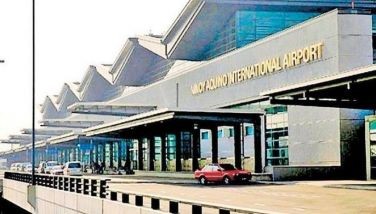Gov’t urged to craft policies for dev’t of agri, mining sectors
MANILA, Philippines - Businessmen yesterday urged the government to immediately lay down policies that would pave the way for the development of large-scale agriculture and value-added extractive industries.
Industry experts speaking at the opening of the 40th Philippine Business Conference held at the Manila Hotel yesterday said the Philippines could attain competitiveness in a changing global economy by maximizing the use of its natural resources.
Speaking on Doing Business in an Evolving Global Economy, Philippine Veterans Bank chairman Dr. Roberto De Ocampo noted that in the past 10 years, global economic power has fast shifted from US dominance and is now shared by China and other emerging economic blocs, therefore giving the Philippines ample opportunity to extend its traditionally US and Europe-centric trade to other emerging growth areas.
One of this is the so-called BRICS market composed of Brazil, Russia, India, China and South Africa.
But first, the Philippines must survive completion within Southeast Asia as it undergoes a regional economic integration that would be fully realized next year, De Ocampo said.
De Ocampo said that while the Philippines cannot easily catch up with the manufacturing and technological prowess of neighboring Asian countries like Japan and Korea, for instance, its agriculture and mining industries have the potential to be globally competitive.
He said the country must, thus, immediately institute policies that would allow for large-scale utilization of agricultural lands instead of perpetuating subsistence farming through agrarian reform, a view shared by many manufacturers experiencing difficulty sourcing commodities for their manufacturing needs.
“We cannot continue to romanticize subsistence farming. We have to work towards agro-industry,” he said.
He said the land reform implemented by the government, an initiative for granting landless farmers and agricultural workers ownership of farmlands, is much too focused on ownership with little means to increase productivity.
“We need to move from land reform towards a mechanism that would allow the country to pursue agro-industry,” he said.
The Agriculture department, De Ocampo cited, has put in place several programs and production schemes that consolidates the efforts of small farmers for the production of major commodities such as sugar. The Sugar Regulatory Administration (SRA), for instance, has put together sugar block farms in Batangas to consolidate production, he said.
The DA is also urging farmers cooperatives to take advantage of the government’s mechanization program and counterpart funding scheme so they could organize themselves as farm service providers (FSP), or units that could provide various farm-related services for large growing areas.
De Ocampo said production growth in the farm sector would lead to the strengthening of light manufacturing which would give small and medium enterprises room for growth.
These initiatives, however, are still in the early stage of implementation and would require continuous education of farmers.
Economist Dr. Cielito Habito said that coupled with trade facilitation, this would help the Philippines maximize the market access benefits under the ASEAN economic community and prepare the Phiippines for other advanced free trade agreements.
De Ocampo said the government should also institute clear-cut policies on the extractive industry particularly on value-adding processes.
“Clear signals are needed so that investors that enter the industry would not only be interested in extraction only but value-adding as well. This way, they can move the industry forward,” he said.
A bill seeking to prohibit exports of mineral ores prior to processing has been filed by Senator Paolo Benigno “Bam” Aquino with the goal of encouraging investments in the processing of metal ores.
The bill was met with apprehension by the mining industry as it is still not clear what constitutes processed ore. Several copper-gold miners, for instance, process their ore into copper concentrate and nickel miners produce nickel concentrate from ore through high pressure acid leach.
Mines Bureau director Leo Jasareno earlier said, however, processed may also mean more finished products such as pig iron, copper cathode and gold bullion.
Miners also believe that the local industry is not large enough to attract investments in processing plants and that the availability of utilities such as power should be considered.
The government, they said, must first encourage growth in the mining industry to encourage investments in the downstream sector.
There are only two nickel processing facilities in the Philippines, both owned by listed Nickel Asia Corp. Most of the country’s nickel ore is shipped to Japanese and Chinese smelters. There are two gold processing plants and one for copper processing.
The government has not yet finalized the proposed changes in the sharing of revenues between the state and mining firms, leaving most firms uneasy about other proposed changes in the industry’s regulation as the effects of the new taxation scheme on their earnings is still uncertain.
- Latest
- Trending





























